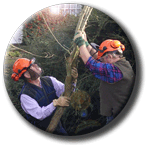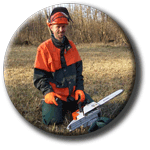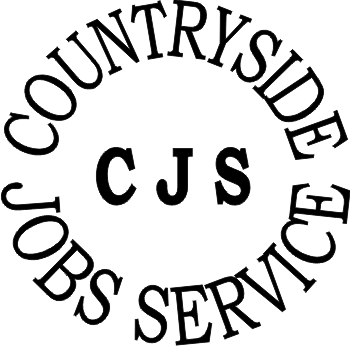Get a job working in the countryside industry
Naturenet shows you how.
S
o, you want to work in countryside management? Naturenet spills
the beans on how to succeed in your quest. There are a lot of people looking
for paid countryside work, and not that many jobs. We've compiled a list of
essential facts to ensure you can measure up your CV before that vital application...
and know what to do after that. So read on to make sure you get your fair chance.
You might wonder, "who are you to tell me how to
get a job?" Just in case, here's the brief answer. The author of
this article, Matthew Chatfield,
was for many years Parks and Countryside Manager for the Isle of Wight Council. He started his
career as an unemployed volunteer and got his first job as a ranger
after a lot of unpaid work. Since then, he has worked as a senior ranger
or manager for various countryside charities and local authorities, and
has advertised, interviewed and appointed 28 full time posts at the last
count. So he's been the chap sifting through all the application forms and, just
maybe, picking out yours. That's not to say he knows it all, but it's a start
anyway.
Don't you just hate it when people in a cosy job sit back
and say how hard it is to get a job? Well here goes: 
• Countryside jobs are few and often poorly paid,
partly because there are always high quality people so keen to do the work
they will do it for next to nothing. This has always been the case and seems
likely to remain so.
• Paid countryside jobs often involve doing lots of boring, non-countryside
stuff, such as litter picking, toilet cleaning, sitting through meetings,
and administration. Nice outside tasks are very often done by volunteers,
and as volunteers are unlikely to want to fill in forms all day or whatever,
that leaves paid staff to do it.
• Working in the countryside does not mean 'getting away from it all'.
Although a few jobs do mean this, most of them involve lots of people,
much of the time. If you don't like people, think hard about what you really
want to do.
• You don't get free\subsidised accommodation with the job any
more - although common 30 years ago, this is now almost unheard-of.
• If you work with visitor attractions your busy times are going to
be weekends and bank holidays, and your busy season will be the summer. So
say goodbye to taking time off in the school holidays or nipping off for a
weekend break at the last minute - you're on the rota to sluice down the bogs
on Christmas Eve!
• A lot of countryside work is a bit 'vocational' - meaning there are
likely to be heavy demands on you out-of-hours, at weekends and evenings,
being accosted by people whilst walking down the street and so on. These extra
hours are hardly ever paid. This can make things like raising a family or
going on holiday quite difficult. Very few countryside jobs are purely 9-5.
But of course it's not all bad news...
• Countryside work can be very rewarding, great
fun, and a really good way to live.
• You get to meet the most extraordinary people and see the most extraordinary
places.
• Countryside staff are well-thought of (mostly) and most people are
interested in what you do and why. Think of it this way: it's better than being
in banking.
• Just occasionally, once in a while, you get to wander around in a wonderful
bit of countryside and get paid for it. Without a shadow of a doubt that makes
it all worth while.
Number One question - 'What qualifications do you need to
become a countryside worker?' Regrettably, there is no easy answer. Jobs vary
a lot, and so do employers. As a rough guide, most people getting an entry-level countryside
ranger job might be expected to
have the following: 
• A relevant degree or at least HND or equivalent
(relevant means life-sciences, or an applied degree like countryside management).
• At least 6 months full-time equivalent employment
experience or volunteering /unpaid
work in a relevant field.
/unpaid
work in a relevant field.
• Driving license (this is essential - read why here)
• Chainsaw card (NPTC or equivalent)..
• First aid training (not necessarily a qualification).
• Experience in practical conservation tasks - not just labouring on
a building site or farm.
If you've done some other things in your life, think about
the skills you've picked up which could be useful to the people you want to
work for. Make sure you tell them, but from their point of view. They don't
want to hear about the details of your window-cleaning business, but might well
be interested in the fact that you managed the books yourself and taught an
apprentice. The following things would probably also be very helpful - and need
not necessarily all be countryside-related. For some jobs they will be essential
- check the job description:
• Basic computer skills.
• Basic report-writing skills.
• Biological recording skills.
• Ability to talk to a group of people.
• Experience of organising guided walks and school groups.
• Health and safety training.
• Experience of operating machinery e.g. tractors and implements.
• Media/online experience (e.g. writing media releases, posting on a blog, using social media for an organisation).
• Some experience of supervising others, e.g. volunteers, contractors or students.
There are also two particular assets that, if you have them,
you should flaunt: a clean, recent DBS check,
and a driving
license that allows you to tow a heavy trailer. Most new graduates
won't have either of these, so if you have, for most typical ranger posts
you're already ahead of the field. The reason they could be important is
that it costs your prospective employer time and effort to get them, and until
they do you may not be able to do all the work of the job.
Some jobs will need particular skills or experience, and many
will need a different balance of some or all of the above.
Just to make things even more confusing, in the UK job titles
in the countryside industry are far from standard. A job called 'Ranger'
can vary from a basic estate worker with no qualifications or experience,
to a senior officer in charge of multi-million pound projects. Even the King
(yes, really) has 'Ranger' as one of his titles - I think it's something
to do with Epping Forest. So the only real answer is to look at a few adverts
and job descriptions for posts you would like to be in and compare them to
your own CV. Download application packs to have a look at them even if you don't think you'll
apply for the job - then assess what comes back and see if you fall short. You
might even be able to persuade a few countryside workers to show you their
own job descriptions.
Do not confuse 'countryside management' with 'environmental
activism'.Here are some things you can forget - I'm
fed up of reading about them:
• Any experience overseas which is not directly
relevant. Just because you've spent a lot of your hard-earned cash going cycling
in Mongolia don't think it'll get you a job - even if it was all for charity.
Conservation work outside Europe is very unlikely to be relevant unless it's
in a comparable climate and habitat to where you want to work. We don't want
to hear of any more Camp-America people who spent weeks saving grizzly bears
with their bare hands. OK?
• We know you love the countryside. That's why you're applying, right?
Don't waste valuable space telling us about how much you love the birds and
the bees.
• We don't want to hear that you are looking for 'a quiet life' or 'a
less stressful job'. You think it's easy, huh? Shows how much you know...
well, actually, you may be right. Even more reason not to mention it.
• Do not confuse 'countryside management' with 'environmental activism'.
We may well have strong views about the climate emergency or fox-hunting, but they do
not usually come into our professional work - in fact, it's important to keep
them out of it. Don't make assumptions about any political issues unless it's
very clear what your prospective employers think about it.
So, you're looking at the screen and there's an empty form on it. What will you do with it? You've
probably heard all the usual advice about speeling things correctly, and so on.
Here's the advice you may not have heard: Read
the job description and everything else.
• Read the job description and everything else
you get sent or linked to. If there are loads of documents that they send you and websites they link to, read it ALL. Sometimes
you might find something interesting tucked away in a corner. Also read
the advert. Check a few different recruitment websites and see if it's the same on each one (some of them have a character limit). You'd be surprised what appears in the advert that might not appear in the application pack.
• Make sure you cover every point on the job description in your application.
Even if it's just to show you've read it. So if it says 'occasionally take
minutes of meetings' make sure you mention how you used to take minutes for
the Brownies or something. It might not mean much to you but if the job is
assessed with a point-scoring system it could count for as much as a chainsaw
card. If you see a document called a 'Person Specification' or something
similar this is a sure-fire indicator that the employer will be assessing
you by ticking boxes. Make sure you cover every single item on the list.
• If it says 'you can ring up for an informal discussion' then do so.
Most people don't. Do it as soon as you can. If the person on the end of
the phone has said it all twenty times they will be a bit jaded. Make sure
you're one of the first. Remember, the call is to listen to the employer,
not really for you to show off (except your polite telephone manner). Don't
try to impress with the phone call, don't try to recite your application
on the phone, but listen to every word you hear. Ask some open questions
to get them talking and make notes. What are the key issues? What was the first thing they said?
• Get this: some organisations really frown upon employees using work email systems to look for jobs. Using email properly can show that you are computer literate and up-to-date, and that's very important. But if you
do email your prospective new employer, make sure you use your own email address. Don't use a work one, in case either your present employer or the future one doesn't like it. It goes without saying that if you have some oh-so-witty email address like quackers@twiddles.net you
should consider using a different one if you want to be taken seriously.
Naturenet reader Lisa
Kerslake from Swift
Ecology adds: "Having worked in conservation and ecology
since 1985, I've done more recruitment than I care to remember, from local
authority posts to wildlife trusts to consultancy. As well as the things
Matthew has already mentioned as being pointless or worse, annoying, (all
of which I totally concur with) I'd like to add two more. Firstly please
try to avoid meaningless phrases that everybody uses - e.g. "I would relish
the opportunity/challenge" is
one in particular that has me reaching for the sick bucket, particularly
when it relates to a job that might involve, as Matthew points out, cleaning
toilets or emptying bins. Secondly, and more importantly, please ensure your
form/CV is spelled/punctuated correctly. This may seem minor and unimportant
if the job does not involve much written work, but believe me it isn't. For
starters it's all part of creating a good impression, and bear in mind your
form may well be assessed by a pedantic sod like me (I have been known, when
particularly riled, to circle all the errors in red and send the form back
to the applicant - well you would think that applicants for a conservation
job would be able to spell dormouse - seriously - wouldn't you?). Secondly
you don't know what the recruiters know about that job emptying the bins
at the bird hide - it may be that they are thinking "if this person is
good they may be able to replace the bird hide information officer when she
goes on maternity leave" -
a job that would require good written skills. If you are no good at spelling/punctuation
then get someone else to check the form for you (preferably someone who can
spell/punctuate). If you're dyslexic, point it out in your covering letter
- but get someone to check your application anyway - it shows you have made
every effort."
So, you got the interview did you? You clever sod. You've
got us to thank for that, you know, so listen good whilst we tell you what to
do now. Some of the following won't help you get the job, but might help you avoid
it! If you can afford it, consider visiting
the site/area, even if you are fairly familiar with it.
• Do a bit of research. Look up the site and organisation. Look at the parent
body's website and see if there's anything happening elsewhere in the
organisation that might be relevent. Check out what else is happening
in the area, and what the big issue of the moment is. Read the local paper and local Facebook groups online. Find out if there is anything controversial
going on. Have a nice safe opinion about it ready to bring out.
• If you can afford it, consider visiting the site/area, even if you
are fairly familiar with it. If it is a visitor facility, go informally, as
a visitor, and experience the site/place as a visitor would. Follow the brown
signs and park in the public car park. Use the facilities. Go and
ask slightly awkward questions of the reception staff, look behind things,
go where you shouldn't (within reason) and see what really goes on. Do the
staff look miserable? Do they look happy? Is the place running well, or not?
Are the bins empty, is the toilet clean? If there's trouble brewing (and there
occasionally is when jobs are changing) you need to know. If you still want
the job, be prepared to tell the interviewers about how you might work within
a disenchanted team, work with 'difficult people', and so on. Don't forget
- they might not know/care that there are problems so don't mention it unless
you are asked.
• Who was the last post-holder? What happened to them? If you can, try
to speak to them. If you can't, or they won't, then you might wonder why.
If you can, get the lowdown from them - after all, they should have no reason
to hide anything. Naturally, you'll ask 'Why did you leave?'
• Do you know anyone who works in the same organisation, perhaps at
another site or department? Don't let them off lightly either. They might
know all sorts of interesting background.
The big day. You've decided to go. So what now?
• Get there in good time and, if there's some nice countryside
around (and lets hope there is) go and settle yourself in it for a few minutes.
• What to wear? Always difficult. Especially if there's a site visit
involved. You might get a chance to change, you might not. If there is a site
visit then be sure not to be caught out with no decent shoes - it will look
terrible. If you are concerned there's no harm in ringing up beforehand and
asking what would be appropriate footwear. As far as the rest is concerned
it's hard to advise but if you've done a reconnaissance visit (see above)
you might have seen the staff then. Note their garb. 
• If you get to walk around with a member of staff (a common practice)
don't give them your prepared speeches and clever answers. Impress them with
your personality and character - that's what they are looking out for. Listen
to them as well as talk. Act like a fellow professional being shown around.
Be interested in where you are and what the staff are showing you. Don't criticise
it - you are the guest. If you are in a group with other interviewees don't,
whatever you do, get drawn into an argument or competition to impress (unless
you are told you should). It's better to say nothing.
• In the interview it's your chance to shine. Make sure you know who
the interviewers are, and what they are likely to be interested in. If you
can find this out beforehand so much the better. Don't forget that a lot of
countryside staff rarely interview and so they might be as nervous as you.
Be prepared to make an effort to put them at their ease (yes really) if you
can. Many organisations now insist on a personnel officer being at an interview.
They are really only there to see fair play in most cases, so if they seem
a bit quiet don't worry.
• Prepare answers to these (stupidly predictable) questions without
necessarily being constrained by honesty:
1. What are your strengths?
Answer: a few credible things taken from whatever the job description asks
for.
2. What are your weaknesses?
Answer: "I'm very hard working, sometimes too hard working. I love
to see something finished and hate to leave a job half done".
3. Why did you/do you want to leave your
last job? Answer: "I love/d my job
but working for your organisation was just too good an opportunity to
miss because...". Note: however provoked, do NOT slag off your
previous/present employer at all. Don't even hint at it.
4. Why do you think that you would be suitable
for the job? Answer: same as 1.
For extra homework see also "25
Questions to Think About Before Your Next Job Interview" from The
Simple Dollar: clever interview ideas which are mostly just as relevent
on this side of the Atlantic.
• After the interview, if you're not in tears or throwing
up, try to remember the questions that were asked. Write them down if you
can. It's also worth asking yourself 'What was this question trying to get
at?'. Sometimes the answer is obvious - if not, that's probably the fault
of the questioner, not you. Looking back at these notes is a good way to practice
and prepare for the next interview - assuming you ever need one of course
- as you are likely to be asked very similar sorts of questions.
Sit back and wait for the jobs to roll in...
GOOD LUCK! Let us know if it works.
If you've got any more tips, send them in to us. We might just
add them to our list.



